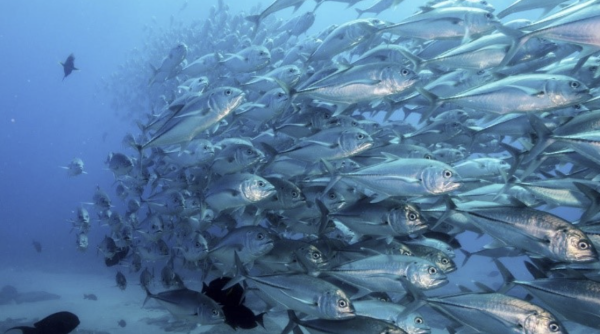Goal of the Month – Environment Outlook
There has never been a more urgent need to protect and repair the environment. Without accelerated efforts to safeguard the health of our planet’s atmosphere, biodiversity and finite resources, there will be no sustainable future. The June edition of Goal of the Month editorial looks at how the United Nations is working to address global environmental challenges related to environment and in particular, Sustainable Development Goals 12 (responsible consumption and production), 14 (life below water) and 15 (life on land).
While the importance of action of individuals cannot be overemphasized to fight such global challenges as climate change, biodiversity loss and pollution, governments, parliaments, businesses, banks, investors and other stakeholders with influence have a crucial role to play in addressing the triple planetary crisis and drive a transition to a circular economy at scale.
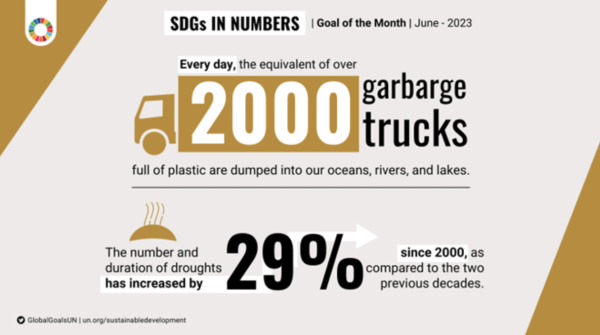
Where are we?
In recent years, the United Nations has made important headways on the environmental front:
- A second round of negotiations is under way in Paris on an epic global agreement to beat plastic pollution – a global problem, which the United Nations Environment Programme addresses in a new report, titled “Turning off the Tap: How the world can end plastic pollution and create a circular economy”. The negotiations are expected to conclude in 2024.
- This month, on 19-20 June, delegates will convene at UN Headquarters in New York to adopt a historic new treaty on the conservation and sustainable use of marine biological diversity of areas beyond national jurisdiction.
- At the UN Biodiversity Conference (COP15) in December 2022, governments reached a landmark agreement — the Kunming-Montreal Global Biodiversity Framework — to address biodiversity loss, restore ecosystems and protect indigenous rights, including by putting 30 per cent of the planet and 30 per cent of degraded ecosystems under protection by 2030.
- In 2021, countries adopted the Glasgow Climate Pact, aiming to turn the 2020s into a decade of climate action and support. They reaffirmed their duty to fulfil the pledge of providing $100 billion annually to developing countries. And they collectively agreed to work to reduce the gap in emission reduction plans to limit the rise in the global average temperature to 1.5 degrees. For the first time, countries were called upon to phase down unabated coal power and inefficient subsidies for fossil fuels.

The UN General Assembly:
- Adopted a historic resolution in July 2022, declaring access to a clean, healthy and sustainable environment as a universal human right.
- Declared the UN Decade on Ecosystem Restoration (2021-2030) to massively scale up the restoration of degraded and destroyed ecosystems as a proven measure to fight the climate crisis and enhance food security, water supply and biodiversity.
- Proclaimed the Decade of Ocean Science for Sustainable Development (2021-2030) to support efforts to reverse the cycle of decline in ocean health and gather ocean stakeholders worldwide to ensure ocean science can fully support countries in creating improved conditions for sustainable development of the Ocean.
- Declared the International Decade for Action on Water for Sustainable Development (2018-2028) to help to achieve internationally agreed water-related goals and targets, including those contained in the 2030 Agenda for Sustainable Development.
_______________________________________________________________________________________________________________________
In Focus
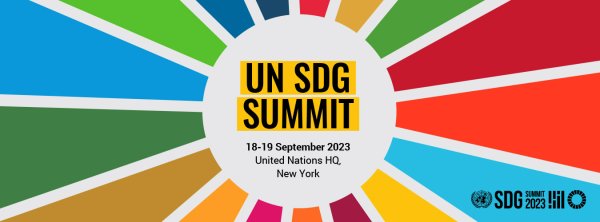
With 2023 marking the midpoint of SDG implementation, it is time for urgent action. The Secretary-General’s report (special edition) on progress towards the Sustainable Development Goals, released in late April, calls for a commitment from all countries to end the war on nature, urging them to support the Acceleration Agenda for climate action and deliver on the new global biodiversity framework.
The upcoming High-level Political Forum on Sustainable Development (10-19 July) will conduct an in-depth review of Goals 6 (clean water and sanitation), 7 (affordable and clean energy), 9 (industry, innovation and infrastructure), 11 (sustainable cities and communities), and 17 (partnerships), which are all important to implementing the 2030 Agenda’s environmental dimension.
The Political Forum will then feed into the SDG Summit, the Climate Ambition Summit and the High-Level Dialogue on Financing for Development, as world leaders gather at UN Headquarters in New York during the General Assembly high-level week in September to turn the tide and kick-start a new drive for SDG achievement.
What to Watch For
Reports
SDG 7 Progress Report (6 June)
The International Energy Agency (IEA), the International Renewable Energy Agency (IRENA), the United Nations Statistics Division (UNSD), World Bank, and World Health Organization (WHO), will release The 2023 edition of Tracking SDG 7: The Energy Progress Report, which highlights the urgent action that is needed to achieve SDG 7 on time. While some progress has been seen on specific elements of SDG 7, progress is still insufficient to reach the targets set forth for the SDGs.
The full report will be available online here. The report will also be presented at a special launch event on 11 July at the High-Level Political Forum (HLPF) on Sustainable Development.

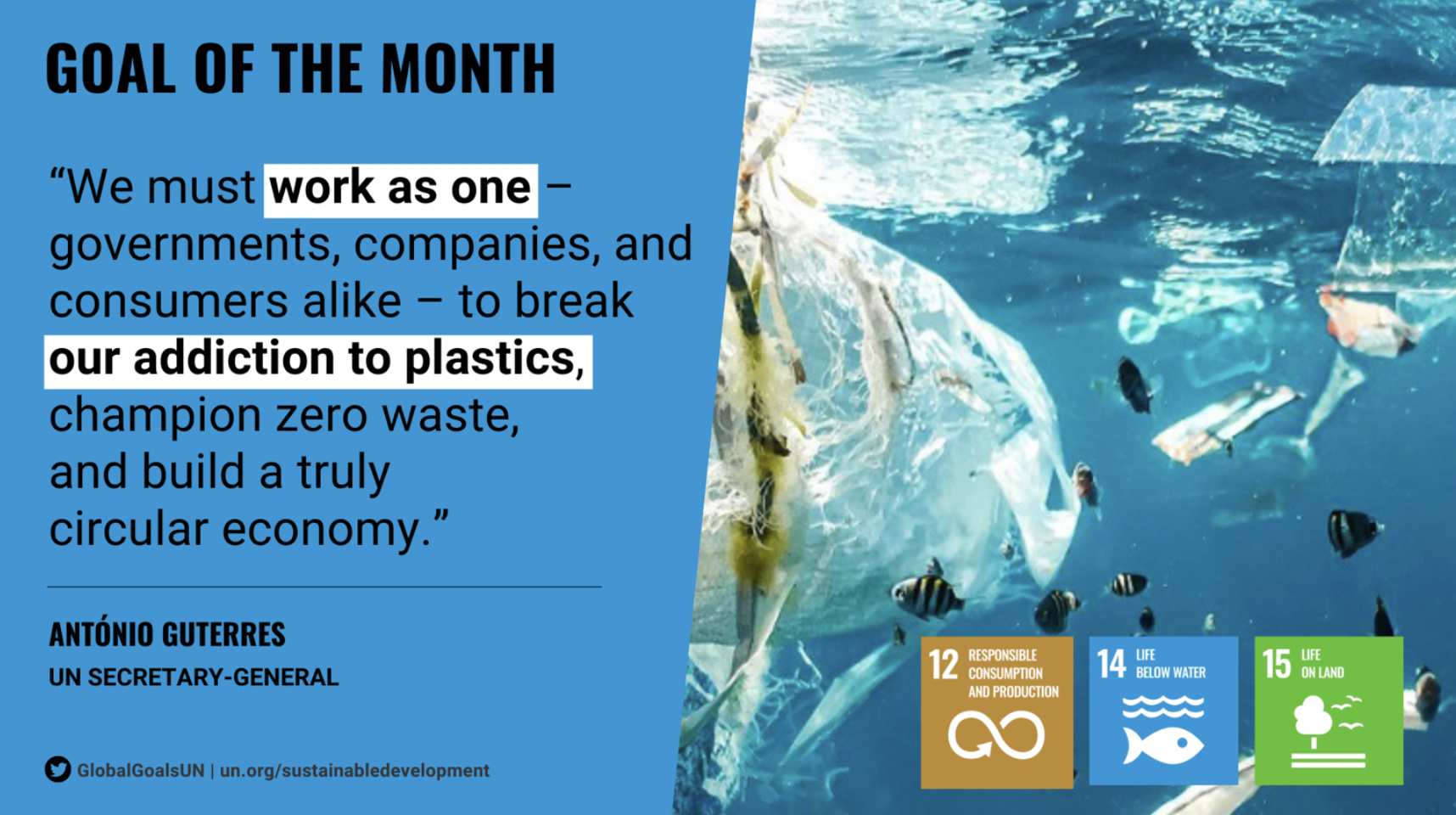
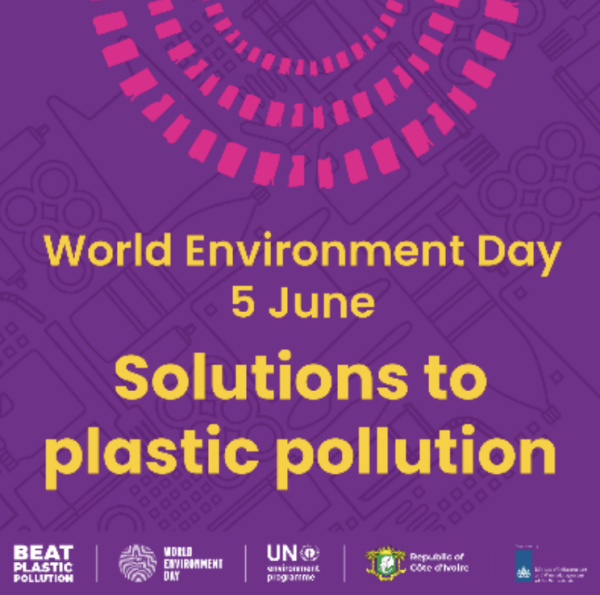 Every year, over 400 million tons of plastic is produced worldwide – one third of which is used just once. Every day, the equivalent of over 2000 garbage trucks full of plastic is dumped into our oceans, rivers, and lakes. World Environment Day 2023 is a reminder that ending plastic pollution needs everyone. While consumer pressure plays a vital role, real action must also come from companies, investors, policymakers, and governments. Last year, the global community began negotiating a legally binding agreement to end plastic pollution. This is a promising first step, but we need all hands-on deck. A new report by the UN Environment Programme shows that we can reduce plastic pollution by 80 per cent by 2040 – if we act now to reuse, recycle, reorient, and diversify away from plastics.
Every year, over 400 million tons of plastic is produced worldwide – one third of which is used just once. Every day, the equivalent of over 2000 garbage trucks full of plastic is dumped into our oceans, rivers, and lakes. World Environment Day 2023 is a reminder that ending plastic pollution needs everyone. While consumer pressure plays a vital role, real action must also come from companies, investors, policymakers, and governments. Last year, the global community began negotiating a legally binding agreement to end plastic pollution. This is a promising first step, but we need all hands-on deck. A new report by the UN Environment Programme shows that we can reduce plastic pollution by 80 per cent by 2040 – if we act now to reuse, recycle, reorient, and diversify away from plastics. 
